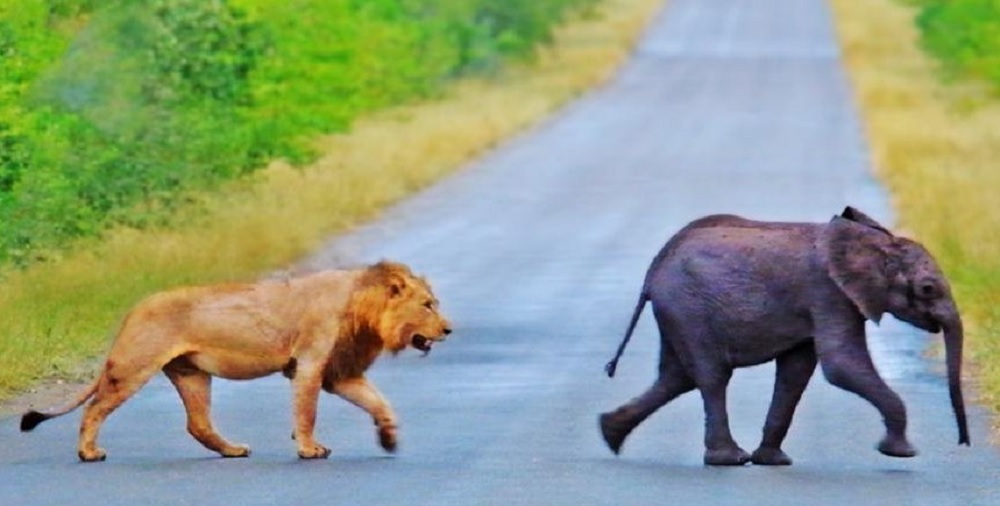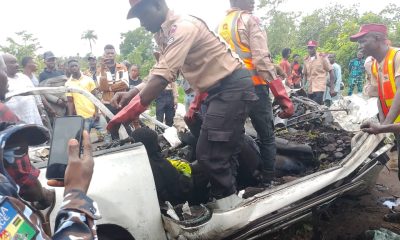News
Kwara reiterates commitment to livestock investment, job creation

By Francesca Hangeior
Kwara State Governor, AbdulRahman AbdulRazaq, has reiterated his administration’s commitment to investing in vital infrastructures and equipment in the livestock sector for the betterment of the citizenry.
AbdulRazaq disclosed this at the opening of the 3rd batch training workshop for additional 100 extension agents and farmers on small ruminant production, and crop residue processing for improved utilisation by ruminants, and the official flag-off of the distribution of crop residue crushers and pelleting machines to livestock farmers.
The event, organised by the Livestock Productivity and Resilience Support Project Coordination Office, was packaged by Synergy Impact Consultant Limited, and Centre for Dryland Agriculture, Kano, held at the National Centre for Agricultural Mechanisation, Idofian in Ifelodun local government area of Kwara state on Thursday.
The governor, who was represented by the state Commissioner for Agriculture and Rural Development, Mrs. Oloruntoyosi Thomas said the livestock sector faces numerous challenges, which include climate change, disease outbreak, and inadequate access to resources and markets.
According to a statement released by the Project Communication and ICT Officer
Kwara L-PRES, Yusuf Ganiyu on Friday, the governor stated that capacity building is to support in overcoming the various livestock management challenges with a view to realizing the potential of the sector in the state.
The aim of his administration, AbdulRazaq said, is to ensure that farmers were equipped to meet the challenges hindering their progress by increasing and enhancing their livestock management capacities.
“Our livestock sector must evolve to meet the demands of our growing population while being mindful of environmental sustainability. By implementing best practices in animal husbandry, we can ensure healthier livestock, improved yields, and reduced environmental impact.
“This is why the state government through L-PRES Project designed a comprehensive initiative aimed at enhancing our livestock capacity through training, education, and sustainable practices to empower our farmers with the skills and knowledge they need to thrive in a rapidly changing agricultural landscape,” the governor said.
He explained that the training will enhance livestock management knowledge in the state, increase the efficiency and effectiveness of the extension agents as well as improve the livelihood and economy of the populace.
Unveiling the crop residue processing equipment, the governor said the initiative is another significant step towards realising the full potential of the livestock sector in the state.
In his remarks, the Special Adviser to the Governor on Special Duties, AbdulRasaq Jiddah tasked the participants to take the opportunities the training offers and utilise it to boost the economy of the state and the country at large.
News
Kenya: Lion kills 14-year-old girl, elephant kills man in separate incidents

A lion killed a 14-year-old girl outside Kenya’s capital Nairobi while an elephant killed a 54-year-old man in the central part of the country, the Kenya Wildlife Service (KWS) said this weekend.
The attack on the girl occurred on Saturday in a ranch to the south of Nairobi National Park.
The attack was witnessed by another teenager, who raised the alarm, the KWS said in a statement.
“KWS rangers and response teams were swiftly mobilized and traced bloodstains leading to the Mbagathi River, where the girl’s body was recovered with injuries on the lower back,” the conservation agency said in a statement.
“The lion was not sighted at the scene,” it added.
It said a trap had been set for the lion and teams deployed to comb the area, along with additional safety measures.
The KWS said a 54-year-old man had also been killed by an elephant in Kenya’s Nyeri County on Friday. The agency gave no further details about that incident.
“KWS conveys its heartfelt condolences to the bereaved families and continues to work closely with local law enforcement and communities to enhance the safety of people living near protected wildlife areas,” it said in the statement.
It called for more investment in “human-wildlife conflict mitigation”, including early warning systems and greater collaboration with affected communities.
In a statement to the BBC Paula Kahumbu, head of the WildlifeDirect conservation group, urged Kenya Wildlife Service to improve “risk assessments and ensure accurate, real-time communication of wildlife movement and behavior, especially in known high-risk areas such as Savannah Ranch,” where the girl was killed.
Last year, police in Kenya recovered the body of a man believed to have been attacked by a lion while he was riding a motorcycle near a national reserve in the south of the country.
The lion population was declining in Kenya just over a decade ago, primarily due to human-wildlife conflict. The government listed lions as endangered, with an estimated population of 2,000 in 2010. A more recent survey put the number at 2,489.
In 2023, 11 lions were speared to death in just one week — including one of Kenya’s oldest wild lions — by herders after the big cats killed their livestock.
Last year, the BBC reported CCTV footage captured the moment a lion snatched a Rottweiler dog from another home near Nairobi National Park
News
Celebrity boxing: Speed Darlington wants rematch after losing to Portable

By Kayode Sanni-Arewa
Nigerian singer Speed Darlington is calling for a rematch against Portable after losing to him in a celebrity boxing match.
Speed Darlington was knocked out in the second round, and he’s unhappy about the outcome.
In a video, he claimed Portable didn’t deserve the win and the prize money, saying he had plans to use the money to build a swimming pool for his community in Imo State.
Portable, I want a rematch. E dey pain me say you dey carry all that money dey go. E dey break my heart.
” I want a rematch. It’s so unfair. You have up to two experience before me and you fight. I never enter ring before. I did not come from poverty,” he said.
“You don’t deserve that money. E dey pain me. I want to build swimming pool for my villagers. I need a rematch, Portable”, he said.
According to Speed Darlington, Portable had an unfair advantage due to his experience, accusing him of using supernatural means to win the fight.
He also claimed he suffered a shoulder injury during the match despite not feeling tired.
Speed Darlington, who wants a rematch, said he needs 30 days to prepare better
News
Israel’s remote controlled bulldozers breaking ground in Gaza war

At first glance, there is nothing unusual about the bulky bulldozer turning up soil at a testing site in central Israel, but as it pulled closer it became clear: the driver’s cabin is eerily empty.
This is the Robdozer, a fortified engineering vehicle manned remotely, and in this case operated from a military expo halfway across the globe in Alabama.
Army engineers and military experts say that the Robdozer — the robotic version of Caterpillar’s D9 bulldozer — is the future of automated combat.
The Israeli military has used D9 for years to carry out frontline tasks like trowelling roads for advancing troops, removing rubble and flattening terrain.
But since war in Gaza broke out in October 2023 and later in Lebanon, the Israeli military has increasingly deployed this robotic version in a bid to enhance its field operations and reduce the risks to its troops.
“The idea is to eliminate the person from the cockpit of the dozer,” said Rani, whose team at the state-owned Israel Aerospace Industries developed the Robdozer.
An unmanned D9 bulldozer digs up a field during a demonstration to the press at the Israel Aerospace Industries (IAI) quarters near Tel Aviv on March 26, 2025. Israel’s increasing use of advanced technology on the battlefield, from air defence systems to a broad range of AI-driven intelligence tools, has been well-documented but also criticised for inaccuracies, lack of human oversight and potential violations of international law. (Photo by GIL COHEN-MAGEN / AFP)
During the Gaza war, the military has increasingly opted for the unmanned version, which can carry out a full range of tasks “even better than a human”, said Rani, using his first name only for security reasons.
While such vehicles and other systems are currently operated by humans, future versions could be autonomous, raising ethical and legal concerns over the unchartered future of warfare being shaped by the Israeli military in the Gaza war.
‘Changing the paradigm’
Israel’s increasing use of advanced technology on the battlefield, from air defence systems to a broad range of AI-driven intelligence tools, has been well-documented but also criticised for inaccuracies, lack of human oversight and potential violations of international law.
Analysts say the growing Israeli deployment of the Robdozer reflects broader global trends towards automation in heavy combat vehicles, like remote-controlled personnel carriers that operate much like drones.
An Israeli military official, who requested anonymity to discuss sensitive matters, told AFP that the army has been using “robotic tools for over a decade, but in very small numbers. Now it is being used in large-scale warfare”.
-

 News23 hours ago
News23 hours agoBLACK EASTER: Over 150 massacred in Plateau, Benue
-

 News19 hours ago
News19 hours agoDouble tragedy: Father, three children, maid killed in Osun road crash
-

 News19 hours ago
News19 hours agoSAD! SEC DG says “we can’t recover N1.3trn Nigerians lost to CBEX ponzi scheme”
-

 News17 hours ago
News17 hours agoNDLEA nabs bandits supplier with drugs concealed in private part(Photos)
-

 Metro23 hours ago
Metro23 hours agoShock as 2 naked lovers found dead in Kogi
-

 News23 hours ago
News23 hours agoIMF expresses concern over high poverty rate, food insecurity in Nigeria
-

 Economy23 hours ago
Economy23 hours agoVolvo announces termination of 800 U.S. workers, cites tariff, market decline
-

 Sports12 hours ago
Sports12 hours agoBREAKING! Arsenal hammer relegation Bound Ipswich 4-0






